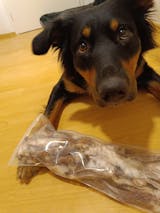Top Produkt, sehr sehr schnelle Lieferung! Sehr zu empfehlen.
BARF for cats
The cat is a pure carnivore. Therefore, the biologically appropriate diet is largely based on the composition of a prey animal.
A wild cat, for example, feeds on smaller prey such as mice. But mice contain not only meat, but also:
- Blood = minerals
- Bones = Calcium
- Fur = fiber content.
For example, in BARF, these ingredients would be replaced by the following:
- Minerals = MicroMineral
- Calcium = calcium supplements or raw meat with bones/cartilage
- Fiber content = vegetables
Just like dogs, cats need bones and calcium as an essential component of their diet, as calcium is particularly important for healthy bones and teeth. In nature, calcium is absorbed through the bones of prey animals, and this must be balanced out when BARFing.
BARF should contain things like muscle meat, bones, fat, organs, plant ingredients, vitamins, amino acids, etc. that roughly correspond to the balance and composition that was contained in the diet of the wild ancestors of our dogs and cats.
Taurine is an essential nutrient for cats and, as beta-aminoethanesulfonic acid, is normally a NON-essential amino acid that the body can produce by synthesizing methionine and cysteine in the liver. However, since cats' own synthesis of taurine is too low to cover their daily needs, taurine must be supplied as a supplement via food (diet).
Therefore, taurine is essential for cats!
Meat is generally considered an excellent source of taurine.
Some taurine-rich foods contain per 100 grams:
- Mussels, fresh 240 mg
- Tuna 70 mg
- Oysters 70 mg
- Pork, fillet 50 mg
- Lamb, fillet 47 mg
- Beef, fillet 36 mg
- Chicken, leg 34 mg
- Cod 31 mg
- Whole milk 6 mg
(Source: www.novamex.de)
Taurine content per 100g:
- Mouse 240.0 mg
- Veal 40.0 mg
- Lamb 47.3 mg
- Turkey leg 306.0 mg
- Beef 36.2 mg
To ensure that the cat receives sufficient taurine, 250-500mg of taurine should be mixed into its food every day.
Mixing is very important because pure taurine can be irritating.
When eating raw meat, the daily requirement of taurine is reduced accordingly.
If heart is fed during BARF, taurine supplementation is NOT necessary, as heart is very rich in taurine.
You can notice an improvement in the skin and coat after just a few days of taurine supplementation.

